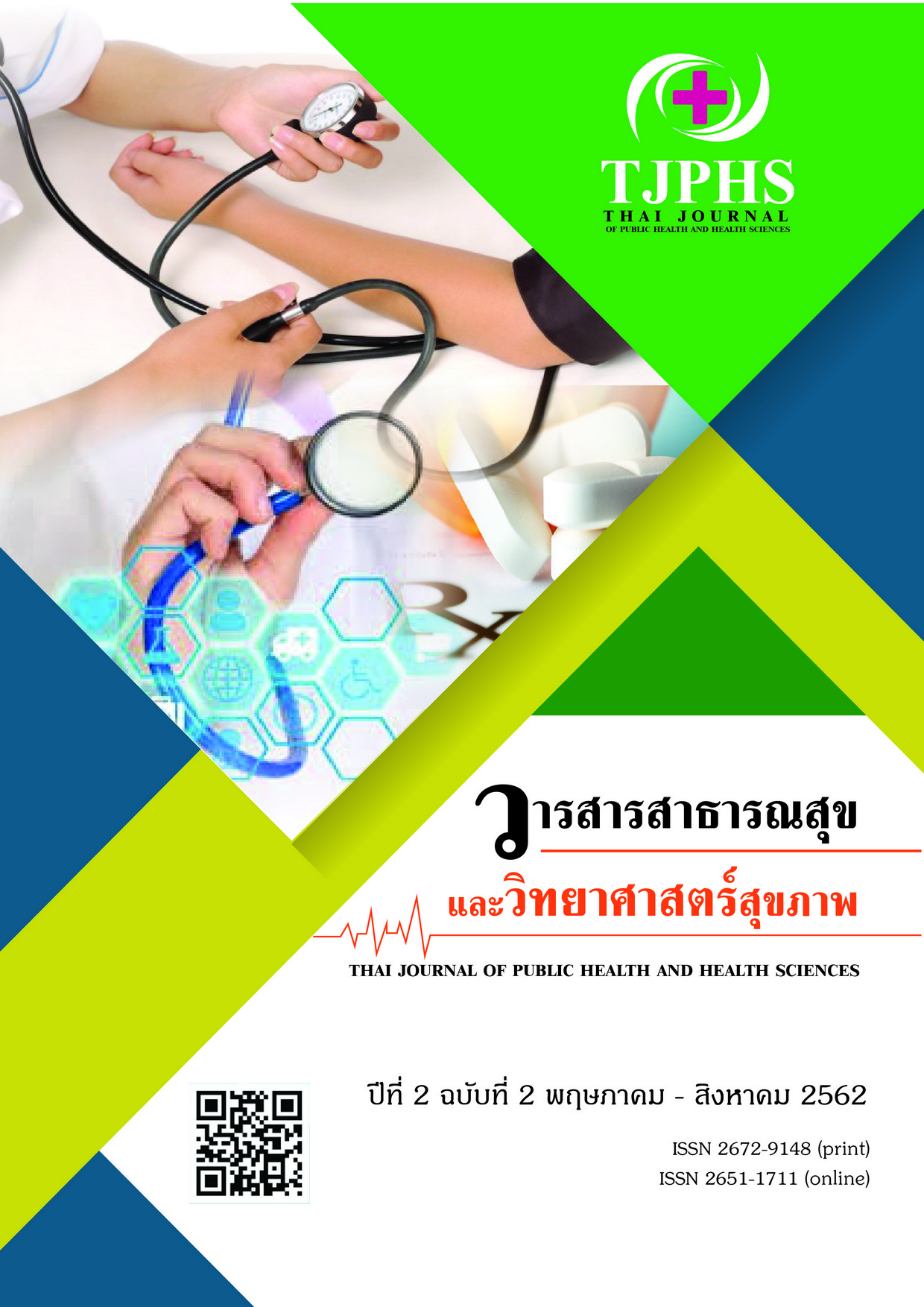ความสัมพันธ์และอำนาจในการทำนายของการสนับสนุนทางสังคม ที่มีต่อพฤติกรรมการดูแลตนเองของผู้ป่วยเบาหวานที่ควบคุมระดับน้ำตาลได้
คำสำคัญ:
ผู้ป่วยโรคเบาหวาน, พฤติกรรมการดูแลตนเอง, การสนับสนุนทางสังคมบทคัดย่อ
การวิจัยหาความสัมพันธ์เชิงทำนายนี้ มีวัตถุประสงค์เพื่อศึกษาระดับการสนับสนุนทางสังคมและระดับพฤติกรรมการดูแลตนเองของผู้ป่วยเบาหวานที่ควบคุมระดับน้ำตาลได้ดี และเพื่อศึกษาความสัมพันธ์และอำนาจในการทำนายการสนับสนุนทางสังคมที่มีต่อพฤติกรรมการดูแลตนเองของผู้ป่วยเบาหวานที่ควบคุมระดับน้ำตาลได้ดี ที่มารับบริการในคลินิกเบาหวาน โรงพยาบาลสิงหนคร ได้มาจากการสุ่มตัวอย่างจำนวน 84 คน เครื่องมือที่ใช้คือแบบสอบถามแรงสนับสนุนทางสังคม และพฤติกรรมการดูแลสุขภาพตนเองของผู้ป่วยเบาหวาน วิเคราะห์ข้อมูลโดยใช้สถิติเชิงพรรณนา สถิติสัมประสิทธิ์สหสัมพันธ์เพียร์สัน และสถิติถดถอยอย่างง่าย ผลการศึกษาพบว่า 1) การสนับสนุนทางสังคมของผู้ป่วยเบาหวาน ที่มารับบริการในคลินิกเบาหวาน โรงพยาบาลสิงหนคร และพฤติกรรมการดูแลตนเองของผู้ป่วยเบาหวาน ในภาพรวมอยู่ในระดับสูง (M=2.59, SD=0.34: M=2.44, SD=0.20 ตามลำดับ) 2) การสนับสนุนทางสังคมมีความสัมพันธ์ทางบวกในระดับปานกลางกับพฤติกรรมการดูแลตนเองของผู้ป่วยเบาหวานที่ควบคุมระดับน้ำตาลได้ดี ที่มารับบริการในคลินิกเบาหวานโรงพยาบาลสิงหนคร อย่างมีนัยสำคัญทางสถิติที่ระดับ 0.01 โดยมีค่าสัมประสิทธิ์สหสัมพันธ์ (r) เท่ากับ 0.505 และ 3) การสนับสนุนทางสังคมสามารถทำนายพฤติกรรมการดูแลตนเองของผู้ป่วยเบาหวาน ที่ควบคุมระดับน้ำตาลได้ดี ที่มารับบริการในคลินิกเบาหวาน โรงพยาบาลสิงหนคร ได้ร้อยละ 25.50 ดังนั้น การจัดกิจกรรมสนับสนุนให้ผู้ป่วยเบาหวาน บุคคลในครอบครัว และผู้ดูแล เข้ามามีส่วนร่วมในการดูแลส่งเสริมให้เกิดพฤติกรรมการดูแลตนเอง อาจช่วยให้ผู้ป่วยเบาหวานดูแลตนเองดีขึ้น และควบคุมระดับน้ำตาลได้ดีขึ้น
เอกสารอ้างอิง
Yuban, N., Duangchan, P. and Jamphol, P. (2015). Relationship between social support health belief self-care behavior and blood pressure of hypertensive patients in Mueang District, Nakhon Nayok Province. Thai Journal of Pharmacy and Health Sciences, 10 (1): 10-18. (In Thai)
Harbsuwan, N. (2016). Issue of the campaign for World Diabetes Day 2015 (fiscal year 2016). Bureau of Non-Communicable Diseases. Retrieved July 20, 61, from www.thaincd.com/document. (In Thai)
Sithisarn, P., Suwannarat, A. and Jailanga., J.. (2013). Factors affecting behavior Self-care of uncontrolled hypertension patients, Dok Khamtai Hospital, Dok Khamtai District, Phayao Province. Journal of Lanna Public Health, 9 (2): 136. (In Thai)
Singhanakorn Hospital. (2017) Data on the number of diabetic patients who control blood sugar levels have been admitted, 2015-2017. (In Thai)
Chuenwattana, W. and Saunpakdee, N. (2014). Self-care behaviors of diabetic patients in Mae Nang Sub-district, Bang Yai District, Nonthaburi Province, 6 (3): 163-170. (In Thai)
Pongpattananon, W. (2011). Factors affecting behavior Blood glucose control of diabetic patients who are unable to control glucose levels: a case study of the Tarueau hospital. Bangkok: Faculty of Public Health Mahidol University. (In Thai)
Kongsomkun, A. (2011). Factors related to behavior Blood level control of diabetic patients Ramathibodi Hospital. Faculty of Public Health, Mahidol University. (In Thai)
Songkhla Provincial Public Health Office. (2017). HDC report, fiscal year 2015-2017. Copied documents. (In Thai)
International Diabetes Federation International Diabetes Federation (IDF). (2016). Issue Campaign for Diabetes Day 2016. Retrieved on July 20, 2016 from https://www.diabetesatlas.org/
Cohen, S. (2004). Social Relationships and Health.American Psychological Society, 14(5): 676-684.
House, J. S., Umberson, D., & Landis, K. R. (1988). Structure and Processes of Social Support. Annual Review of Sociology,14: 293-318.
Orem, D. E. (1995). Nursing: Concepts of Practice. Missouri: C.V. Mosby
Ozbay,B.,Johnson, D. C., Dimoulas, E., Morgan, C.A., Charney, D., & Southwick, S. (2007). Social Support and Resilience to Stress.Psychiatry(Edgmont),4(5): 35–40.
Wiersma, W. &Jurs, S.G. (2009). Research Methods in Education. Massachusetts: Pearson.
ดาวน์โหลด
เผยแพร่แล้ว
รูปแบบการอ้างอิง
ฉบับ
ประเภทบทความ
สัญญาอนุญาต
บทความทุกบทความที่ได้รับการตีพิมพ์ถือเป็นลิขสิทธิ์ของ วารสารสาธารณสุข
















